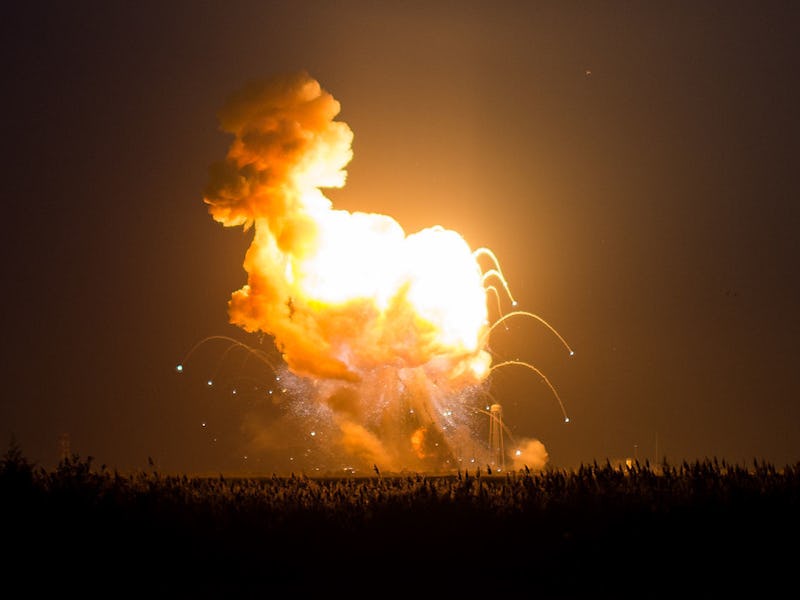This is What SpaceX's Failure Really Means
It's a lot more than just an explosion.

Astronaut supplies weren’t the only things damaged when SpaceX’s unmanned International Space Station-bound Falcon 9 rocket exploded last Sunday. This epic fail marked the third time in eight months that a cargo rocket didn’t make it to the ISS, so it should come as no surprise that NASA’s plans to rely on commercial spacecraft also took a big hit.
The American space agency has been in a tricky situation ever since they discontinued their Space Shuttle program in 2011. Without their own rockets, they’re now pretty much dependent on Russian rockets to ferry astronauts and cargo up to the ISS. When the prospect of commercial spacecraft arose — companies like SpaceX, Virgin Galactic, and Orbital ATK — a future built on partnerships seemed like a great possibility. But now, after yet another failure, things are looking a little less hopeful. What does this failure really mean?
Lost space cred
Elon Musk’s rep just took a huge hit. Though his brainchild SpaceX has built up significant credibility by launching 18 consecutive successful flights and successfully sending private satellites into space, it’s also been recently plagued with launch delays, and now, all Falcon 9 rocket launches are on hold until SpaceX’s engineers can figure out what went wrong last Sunday. “Public perceptions were hit less hard by the Orbital Sciences and Russian failures,” said Scott Pace, director of the Space Policy Institute at The George Washington University, in an interview with Nature. “But because of the visibility that SpaceX claims, this hits public perception more. If one lives by the press release, one can be harmed by the press release.”
Less Government Support
Congress hasn’t exactly been generous with their funding for NASA’s partnerships with commercial partners in recent months, and this certainly isn’t going to help. Last year, NASA’s request for funding was about $439 million more than Congress had allocated. NASA administration claims that money is crucial in supporting its current plans with Boeing and SpaceX, which in turn are necessary to make the agency’s long-term plans to send a human mission to Mars in 2030 a reality, but government funders have been hesitant. And, to add to the pressure on Congress, the Pentagon has been urging them to ease sanctions on Russian engines because they don’t want to rely solely on companies like SpaceX to get to space.
Are We Now At Russia’s Mercy?
One thing is certain: unless commercial spacecraft developers get it together, NASA’s going to be increasingly reliant on Russian rockets to get them to the ISS. Currently, NASA shells out $70 million per seat on Russia’s Soyuz spacecraft every time they need to get astronauts to the ISS. Thankfully, relations between NASA and Roscosmos are currently stable, despite the worsening political situation between the U.S. and Russia, but if things sour, Americans are pretty much stranded. “NASA took themselves out of the game,” said Roger Handberg, a space policy expert at the University of Central Florida, speaking to Nature. “Right now we can send people to the space station, we just can’t send them anything to eat. The International Space Station has become in a sense a hostage to the inability of anyone to get it done.” In response to the SpaceX failure, Russian Deputy Prime Minister Dmitry Rogozin, who never passes up a chance to troll NASA, tweeted: “After the fall of Falcon rocket, the only hope is Soyuz.”